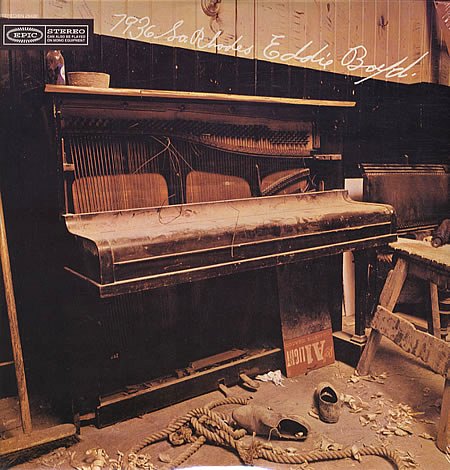|
|
|
01 |
You Got To Reap |
|
|
|
02:23 |
|
|
02 |
Just The Blues |
|
|
|
05:35 |
|
|
03 |
She Is Real |
|
|
|
03:00 |
|
|
04 |
Backslap |
|
|
|
02:48 |
|
|
05 |
Be Careful |
|
|
|
05:25 |
|
|
06 |
Ten To One |
|
|
|
02:43 |
|
|
07 |
The Blues Is Here To Stay |
|
|
|
02:06 |
|
|
08 |
You Are My Love |
|
|
|
04:13 |
|
|
09 |
Third Degree |
|
|
|
04:41 |
|
|
10 |
Thank You Baby |
|
|
|
01:59 |
|
|
11 |
She's Gone |
|
|
|
05:30 |
|
|
12 |
I'll Never Stop (I Can't Stop Loving You) |
|
|
|
03:19 |
|
|
|
| Studio |
CBS Studios |
| Country |
International |
| Original Release Date |
1968 |
| Spars |
DDD |
| Sound |
Stereo |
|
| Guitar-Electric |
Peter Green |
| Bass Guitar |
John McVie |
| Vocal, Piano |
Eddie Boyd |
| Drums and Percussion |
Mick Fleetwood |
|
| Producer |
Mike Vernon |
| Engineer |
Mike Ross |
|
Eddie Boyd
AKA born: Edward Riley Boyd
Born Nov 25, 1914 in Stovall, MS
Died Jul 13, 1994 in Helsinki, Finland
Styles Chicago Blues, Electric Chicago Blues, Piano Blues
by Bill Dahl
Few postwar blues standards have retained the universal appeal of Eddie Boyd's "Five Long Years." Cut in 1951, Boyd's masterpiece has attracted faithful covers by B.B. King, Muddy Waters, Jimmy Reed, Buddy Guy, and too many other bluesmen to recount here. But Boyd's discography is filled with evocative compositions, often full of after-hours ambience.
Like so many Chicago blues stalwarts, Boyd hailed from the fertile Mississippi Delta. The segregationist policies that had a stranglehold on much of the South didn't appeal to the youngster, so he migrated up to Memphis (where he began to play the piano, influenced by Roosevelt Sykes and Leroy Carr). In 1941, Boyd settled in Chicago, falling in with the "Bluebird beat" crowd that recorded for producer Lester Melrose. He backed harp legend Sonny Boy Williamson on his 1945 classic "Elevator Woman," also accompanying Bluebird stars Jazz Gillum, Tampa Red, and Jazz Gillum on wax. Melrose produced Boyd's own 1947 recording debut for RCA as well; the pianist stayed with Victor through 1949.
Boyd reportedly paid for the date that produced "Five Long Years" himself, peddling the track to JOB Records (where the stolid blues topped the R&B charts during 1952). Powerful DJ Al Benson signed Boyd to a contract with his Parrot imprint and promptly sold the pact to Chess, inaugurating a stormy few years with Chicago's top blues outlet. There he waxed "24 Hours" and "Third Degree," both huge R&B hits in 1953, and a host of other Chicago blues gems. But Boyd and Leonard Chess were often at loggerheads, so it was on to Narvel "Cadillac Baby" Eatmon's Bea & Baby imprint in 1959 for eight solid sides with Robert Lockwood Jr. on guitar, and a slew of lesser labels after that. A serious auto wreck in 1957 had stalled his career for a spell.
Sick of the discrimination he perceived toward African Americans in this country, Boyd became enamored of Europe during his tour with the 1965 American Folk Blues Festival, so he moved to Belgium. The recording opportunities long denied him in his native land were plentiful overseas; Boyd cut prolifically during the late '60s, including two LPs for producer Mike Vernon. In the early '70s, he settled in Helsinki, Finland, where he played often and lived comfortably until his death.
7936 South Rhodes
Artist Eddie Boyd
Date of Release Jan 25, 1968
Recorded in London in January 1968 with three members of the early lineup of Fleetwood Mac (the one that played blues, not pop/rock): Peter Green (guitar), John McVie (bass), and Mick Fleetwood (drums). It's an adequate setting for Boyd's straight Chicago piano blues, going heavier on the slow-to-mid-tempo numbers than the high-spirited ones, though Green is a far more sympathetic accompanist than the rhythm section. - Richie Unterberger
1. You Got to Reap (Boyd)
2. Just the Blues
3. She's Real
4. Back Slack
5. Be Careful
6. Ten to One
7. The Blues Is Here to Stay
8. You Are My Love
9. Third Degree (Boyd/Dixon)
10. Thank You Baby (Boyd)
11. She's Gone
12. I Can't Stop Loving You
Eddie Boyd - Piano, Vocals
Mick Fleetwood - Drums
Mike Vernon - Producer
John McVie - Bass
Peter Green - Guitar
Mike Ross - Engineer
Neil Slaven - Liner Notes
Richard Vernon - Coordination
Robert Dowling - Photography
1996 CD BGO 195
1968 LP Epic 26409
CD BGO 195
